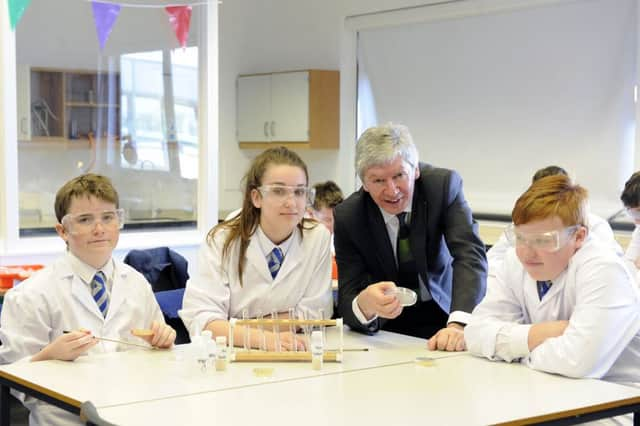Schools '˜could do better' educating youngsters


Dr Bill Maxwell was at Larbert High this week to launch the findings on Scottish schools over a four-year period.
The school was recently the first in the country to achieve an “excellent” since a more rigorous system was introduced last year.
Advertisement
Hide AdAdvertisement
Hide AdHe highlighted “variable” standards in primary education and said financial constraints had been a challenge across the sector.
But he said that, overall, inspectors had been impressed with the commitment shown by leaders and staff.
Dr Maxwell said he had found “many strengths” across all sectors of education and examples of “outstanding innovative practice”.
The report - Quality and Improvement in Scottish Education 2012-2016 - set out five key areas for improvement:
Advertisement
Hide AdAdvertisement
Hide Ad*Exploiting fully the flexibility of Curriculum for Excellence to meet students’ needs better
*Improving arrangements for assessing and tracking pupils’ progress
*Maximising the contribution of partnerships with other services, parents and the wider community
*Improving self-evaluation by students
*Growing a stronger culture of collaboration between establishments to promote innovation, and share good practice.
Advertisement
Hide AdAdvertisement
Hide AdEducation inspectors said Scottish education had gone through a period of “very significant reform”.
Dr Maxwell, who is due to retire from his role in June, said: “Overall, our inspectors have been impressed by the strong commitment of leaders and staff to improving outcomes for children and young people.
“High-quality leadership will be essential to ensuring that sufficient progress is made, across all sectors, in order to continue to secure improvements in education practice and achieve our national ambition of ensuring all learners can reach their potential, regardless of their background.
“We believe that addressing these five priority areas for improvement effectively will make a decisive contribution to achieving the twin aims of excellence and equity for Scottish learners which is at the heart of the National Improvement Framework.”
Advertisement
Hide AdAdvertisement
Hide AdEIS General Secretary Larry Flanagan said the report was a “substantial piece of work” which highlighted “the continuing strengths of Scotland’s education system including the very high levels of commitment that are demonstrated by Scotland’s teachers”.
He added: “Education Scotland itself has to be more proactive in supporting schools and teachers.
“Criticism has been voiced by many members, for example, about poor support and a lack of communication around the introduction of new national qualifications.
“As a well-funded agency it needs to deliver that crucial support as well as provide a critical voice to government policy making, which should be evidenced based at all times.
Advertisement
Hide AdAdvertisement
Hide Ad“One thing that is very clear throughout the report is the degree of change compared to the scale of cuts throughout education, and this will continue to create challenges until the politics of austerity cease and education budgets are substantially increased.”